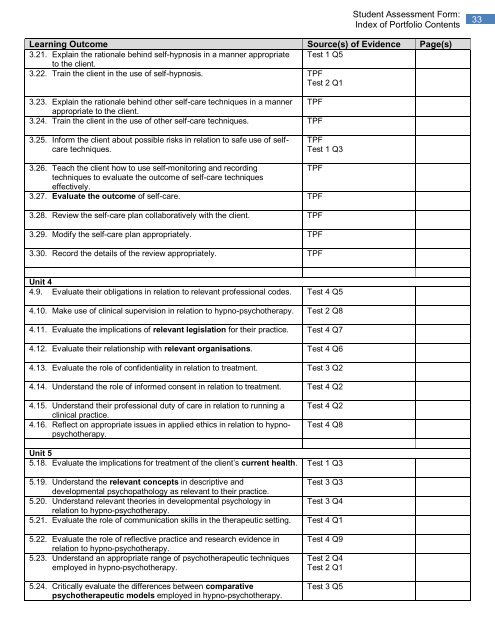Diploma in Cognitive-Behavioural Hypnotherapy - REBHP
Diploma in Cognitive-Behavioural Hypnotherapy - REBHP
Diploma in Cognitive-Behavioural Hypnotherapy - REBHP
Create successful ePaper yourself
Turn your PDF publications into a flip-book with our unique Google optimized e-Paper software.
Student Assessment Form:Index of Portfolio Contents33Learn<strong>in</strong>g Outcome Source(s) of Evidence Page(s)3.21. Expla<strong>in</strong> the rationale beh<strong>in</strong>d self-hypnosis <strong>in</strong> a manner appropriate Test 1 Q5to the client.3.22. Tra<strong>in</strong> the client <strong>in</strong> the use of self-hypnosis. TPFTest 2 Q13.23. Expla<strong>in</strong> the rationale beh<strong>in</strong>d other self-care techniques <strong>in</strong> a manner TPFappropriate to the client.3.24. Tra<strong>in</strong> the client <strong>in</strong> the use of other self-care techniques. TPF3.25. Inform the client about possible risks <strong>in</strong> relation to safe use of selfcaretechniques.TPFTest 1 Q33.26. Teach the client how to use self-monitor<strong>in</strong>g and record<strong>in</strong>gTPFtechniques to evaluate the outcome of self-care techniqueseffectively.3.27. Evaluate the outcome of self-care. TPF3.28. Review the self-care plan collaboratively with the client. TPF3.29. Modify the self-care plan appropriately. TPF3.30. Record the details of the review appropriately. TPFUnit 44.9. Evaluate their obligations <strong>in</strong> relation to relevant professional codes. Test 4 Q54.10. Make use of cl<strong>in</strong>ical supervision <strong>in</strong> relation to hypno-psychotherapy. Test 2 Q84.11. Evaluate the implications of relevant legislation for their practice. Test 4 Q74.12. Evaluate their relationship with relevant organisations. Test 4 Q64.13. Evaluate the role of confidentiality <strong>in</strong> relation to treatment. Test 3 Q24.14. Understand the role of <strong>in</strong>formed consent <strong>in</strong> relation to treatment. Test 4 Q24.15. Understand their professional duty of care <strong>in</strong> relation to runn<strong>in</strong>g acl<strong>in</strong>ical practice.4.16. Reflect on appropriate issues <strong>in</strong> applied ethics <strong>in</strong> relation to hypnopsychotherapy.Test 4 Q2Test 4 Q8Unit 55.18. Evaluate the implications for treatment of the client‘s current health. Test 1 Q35.19. Understand the relevant concepts <strong>in</strong> descriptive andTest 3 Q3developmental psychopathology as relevant to their practice.5.20. Understand relevant theories <strong>in</strong> developmental psychology <strong>in</strong> Test 3 Q4relation to hypno-psychotherapy.5.21. Evaluate the role of communication skills <strong>in</strong> the therapeutic sett<strong>in</strong>g. Test 4 Q15.22. Evaluate the role of reflective practice and research evidence <strong>in</strong>relation to hypno-psychotherapy.5.23. Understand an appropriate range of psychotherapeutic techniquesemployed <strong>in</strong> hypno-psychotherapy.5.24. Critically evaluate the differences between comparativepsychotherapeutic models employed <strong>in</strong> hypno-psychotherapy.Test 4 Q9Test 2 Q4Test 2 Q1Test 3 Q5


